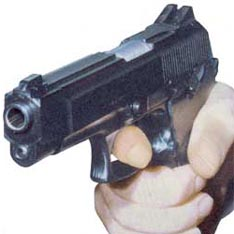Licence to kill By Sergei Gligashvili, special to Prague Watchdog
29-year-old Umar Israilov, a witness to the crimes of Chechnya’s current president, was one of the few people who ventured openly to accuse his former boss of direct involvement in torture, killings and abductions. In addition, Israilov did more than express his opinions – his New York Times interview was merely one stage in a more serious and far-reaching programme of action.
It must be acknowledged that the complaint against Kadyrov which Umar Israilov filed with the European Court of Human Rights in 2006 was a far more important and effective move in terms of its legal implications. Regardless of the court’s verdict, a very substantial precedent was set by the proceedings themselves, which entailed the investigation of major crimes against the person. It was one of the first steps in creating the basis for the further prosecution of Ramzan Kadyrov, albeit in absentia.
Kadyrov’s emissaries were sent to Vienna in order to try to silence Israilov and force him to withdraw his complaint to the Court. That he did not do. For a few weeks before his death Israilov noticed he was being followed, and asked the Austrian police for protection. The request was naturally denied. Europe’s attitude to Chechen refugees is less than cordial, and their assertions of the danger posed to them by Kadyrov’s regime are in most cases simply not believed. On January 13 two Chechens ambushed Israilov outside a supermarket and shot him dead.
As someone who is well-informed about the methods Kadyrov employs to deal with his enemies, I have sufficient confidence to say that the order for the killing came directly from him.
Kadyrov has long been trying to bring influence to bear on those of his compatriots who have found refuge in Europe. With a fair amount of success he negotiates with Ichkerian politicians about their possible return to their native land, or at least about their cooperation. The list of people who enjoyed authority in separatist circles but have agreed to perform this or that service for the current Chechen government is continually growing longer.
However, high-profile political killings on European soil are a special area, requiring access to the top. Obviously, the right to eliminate opponents is granted only to special units operating with the support of the Russian law enforcement agencies. In the light of the investigation of the murder of Yandarbiyev it may be said that the right to put down enemies of the Russian state is in the hands of the General Intelligence Directorate (GRU) of the Ministry of Defence. It is most probable that tasks of this kind are entrusted to the FSB and the Foreign Intelligence Service (SVR). In reality it does not matter. The number of special services involved is, of course, very limited, and decisions on assassination are taken either by the leadership of these services or on an even higher level.
Was Israilov’s shooting authorized by the Russian government? I think it unlikely. Alexander Litvinenko, who waged a much-publicized and unrestrained campaign to discredit the security forces, took out of Russia enough information for two books which very convincingly describe the manners and customs of Russia’s principal law enforcement body. In the paradigm of a Russia that was “rising from its knees”, Litvinenko’s efforts could not go unnoticed and unpunished as they might have done in the days of Boris Yeltsin. The punishment of traitors was a vital part of the traditions observed by the government agency of which Vladimir Putin, the President of the day, happened to be a graduate.
Zelimhan Yandarbiyev, who was murdered somewhat earlier, allegedly collected funds in the Arab world so that the Chechen underground could continue fighting. In the eyes of the state that was waging the war, this was a major reason for eliminating him. On the other hand, no attempt was made to assassinate Akhmed Zakayev, who represented the political interests of Maskhadov and the underground. Many other Chechens still continue to launch constant attacks on Russia in the Council of Europe and the OSCE, making statements on public platforms wherever they can with the aim of rousing Western public opinion and politicians against the Kremlin. These people have also succeeded in preserving their lives without visible effort.
It is highly doubtful that the government bodies in charge of topics as sensitive as that of political killings had serious cause to be displeased with Umar Israilov. After all, the discrediting of the head of a federal entity, even he is one of Putin’s friends, cannot be considered a serious matter and clearly does not count as a problem on a national scale.
So did Kadyrov exceed his authority and take an independent decision to murder his former bodyguard? That is the most logical explanation for what happened.
Whether Kadyrov will get away with the Vienna scandal is impossible to predict, but it looks as though no one, either in the Kremlin or in Europe, is going to make much fuss about a single corpse. The unfortunate incident will have no effect at all on bilateral relations between Russia and Austria. And in Moscow Kadyrov will receive a ticking-off and be told once again to act in accordance with the mandate that grants him the right to hunt only within Russia.
The photograph is borrowed from the website of utro.ru. (Translation by DM) (P/T)
DISCUSSION FORUM
|

